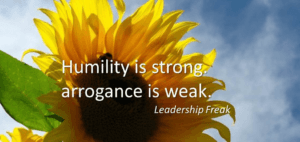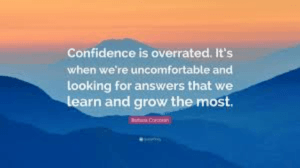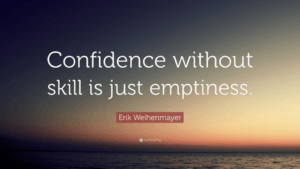Humility vs. Confidence
In my extensive work as a life coach, I have observed that humility is a terribly underrated virtue. Even if you look up articles about it, for every one about humility being important, you can find at least 10 or more written about self-confidence. With that kind of disparity, you might not think that humility is important at all. For example, if you do a Google search of “improving confidence,” you find 171,000,000 results…cool, right? Well, now look up “improving humility,” and you find a little over 600,000 results. I find that disappointing when you consider the position humility can take in our daily lives.
What a lot of people miss is that humility is an, if not the, main tool for self-improvement. When you mindfully stay humble, you will find yourself open to new and unexpected opportunities to improve yourself or your work. If I offer to you a way for you to possibly triple your business, you are required to implicitly accept the possibility that the way you are doing things now might be costing you 2/3’s of your potential revenue. Only with humility will you allow this incredible possibility to sink in.
When you mindfully stay humble,
you will find yourself open
to new and unexpected
opportunities
to improve yourself or your work.
Now let’s skip over the idea of financial success for a minute and consider something even more important. Humility is one of the most important virtues for inner well-being. Those giant frustrations and possibly heartbreaking life experiences lose some of their impact if your ego isn’t involved. Now, if you combine humility with motivation, you suddenly have the ability to drive hard towards successes without letting the failures knock you out of balance. This works in both your business and your personal/family life.

Confusing Confidence with Skill
I think a lot of the mistaken advice on how to improve confidence has to do actually with improving skill. I’ve heard this before:
“I want to be a more confident public speaker.”
To which I find myself mentally replying,
“Do you really want to be more confident? Or do you just want to be a better speaker?”
Frankly, I’d rather listen to a humble but fantastic speaker than an arrogant bore. How about you?
Unfortunately, some people believe skill and confidence are the same thing.
The same happens with social skills. Some people claim to want to be more confident with other people or relationships. But do they really? Or do they simply want to have better social skills. Confidence without skill would just mean that the person is oblivious to the negative reactions from other people.
Confidence and Skill
There are some areas where confidence is used as a signal of sorts. If a speaker is confident, I’ll believe she is more skilled. This is partially because I take her confidence as a signal of a deeper, but harder to detect, skill level. Then the person speaks and we discover the truth.
While I believe that confidence can seem to be an indicator of success, I think the reason confidence is so revered these days is that it has an easier explanation. Skilled people succeed regularly, and lots of successes can indeed create confidence. Naturally, when you see a successful person, you usually see a confident one too. Here is the thing to be careful about though; confidence didn’t create the success, it is an outcome of it.
Skilled people succeed regularly,
and lots of successes can
indeed create confidence.
Real skill creates both success and confidence. Reversing the progression by putting confidence first has a temporary effect in looking like success is on the way, but it usually doesn’t work. Confidence doesn’t make you a better mathematician, or electrician, so what’s up with people who believe like it’s the essential element for being a better presenter, writer, or salesperson? Why the effort the shortcut?
Confidence and Happiness
The second biggest reason that developing confidence is pursued, beyond its fundamental attractiveness, is that it just feels good to be confident. Standing up on a stage lacking confidence makes you feel sick. With your confidence at 100%, on the other hand, you can love giving a presentation.
I would disagree though with this perception, because once again, I think it’s easy to mistake correlation for causation. I contend that skill, not mindless confidence, creates a sense of well-being when performing tasks. When I have skill, I’ll gain the outcome I want from my actions. Like the skilled master, each brush stroke gives the sought-after visual effect. This is called a positive feedback cycle, and it gives much greater returns than a fake sense of self-assurance.
Confidence Overrating
Now I don’t think you should completely discount confidence, but I really do believe it is overvalued these days. It is overvalued as an indicator of—and as a technique for—well-being. Guys, it is at best a short-term antidote. Confidence without matching skill isn’t worth a tinker’s damn.

Humility, on the other hand, is an extremely valuable discernment. Don’t be confused; humility isn’t the same thing as low self-confidence. Confidence and self-esteem suggest a kind of certainty in your actions. If you have high confidence, you probably will predict success. If you have low confidence, you likely will predict failure.
Humility isn’t the same
thing as low self-confidence.
Humility doesn’t need to imply any skill level at all. In my coaching, I suggest that being humble is all about being open to the possibility of improvement. While confidence is a scale predicting success, humility is an absence of that scale, allowing for your growth.
Humble Confidence
Humble confidence really isn’t an oxymoron as you might assume. If you are skilled at something, you can be confident in your level of success, but at the same time humble enough to understand that there is still a great deal of room to learn and grow.
After running this website for several years, I’m confident that I’ll get positive feedback from writing a book or article. But I also realize that my own room for growth is tremendous. By seeing other authors covering related topics, reaching millions of people with an even greater impact, I’m humbly aware of my own room for growth.
Humility Without Confidence
Understandably, if you have lots of experience, humble confidence is the way to go. Indeed, it will give you that sense of satisfaction in your work while remaining open to new ideas and opportunities. But if you’re just starting out, you might not yet have the skills you need to succeed. In this case, I submit that the best route is to focus on humility first without focusing too much on your level of confidence.
Many people try to shortcut the painful beginner’s process by “faking.” You have heard it—fake it till you make it. A greater level of confidence than their skills suggest. For a short time, this works. But soon the negative feedback will undermine your pretend sense of confidence and keeping it up with it will become increasingly more difficult. The impending fall from grace, that awareness that you are really lost, may even make you feel even less confident than before.
The best route is to focus on
humility first without
focusing too
much on your level of confidence.
Worse than anything though, faking confidence undermines humility. By assuming a level of confidence above your skill level that you have not yet earned, you cut off opportunities to learn. Instead of accepting feedback and adjusting your actions, you just ignore it. Humility fosters growth; false confidence restricts it every time.

When I started my coaching business, humility was much more valuable to me than faking confidence. Whenever I tried to fake a confidence level higher than my actual skills, I was blinded to new methods and options. Instead of trying a better way of writing articles or generating revenue, I’d slide back to my old bad habits and thus limit my own growth.
Humility fosters growth;
false confidence restricts it every time.
Even today, humility is still more important to me than confidence. Although I’m confident I can achieve a satisfactory level of success with my current abilities, I know that I need to stay humble and continue to learn. Humility allows me to explore unexpected opportunities. What I’ve done to get me here won’t get me to where I want to go. Knowing that keeps me humble and open to new avenues
Humility, Well-Being and Beginner’s Frustrations
The irony and hypocrisy of writing an article about humility are not lost on me. Just by writing, it presupposes I’m some kind of expert. Let me clear that up for you now—I’m most definitely not. I labor daily to keep my confidence in perspective, while maintaining an extra dose of humility, but it isn’t easy. I fail often.
I understand that the frustrations of being a beginner at anything in life can breed the desire to be confident …urgently. We all know that when you haven’t built up a skill set, the failures can be discouraging, ego-bruising, and painful. The response to this is the desire we are told is confidence. But I believe this desire is flatly misguided.
Humility, in fact, leads to faster improvement than confidence. More importantly, staying humble allows the temporary frustrations to slide off you and your life. Trying to maintain a false sense of confidence might build a string of temporary successes, but it makes every failure bigger and more difficult to recover from.
Remember these three rules in life:
- Confidence without skill is nothing
- Skill without humility is stagnant
- Skill with humility creates to confidence
Do you see the cycle now?
SPEAK WITH A LIFE COACH IN BATON ROUGE
Frank Hopkins is a life coach in Baton Rouge who is certified as a Professional Coach (CPC) by the Institute for Professional Excellence in Coaching (iPEC). Frank has helped numerous people to go through emotional change in a way that is positively transformative.

